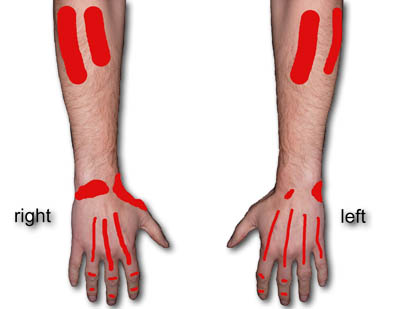 Below, I provide a list of criteria that I would associate with a worker who will have an elevated risk of contracting an RSI condition. If you associate with a few of these activities, then you too may be at high risk of developing a RSI condition –
Below, I provide a list of criteria that I would associate with a worker who will have an elevated risk of contracting an RSI condition. If you associate with a few of these activities, then you too may be at high risk of developing a RSI condition –
- Computer operator professional or otherwise
- Deep in concentration about your work, intolerant of interruptions
- You slouch at your desk, peering at the computer screen, unaware of your posture
- Working on a key project with tight deadline
- Stressing about achieving that deadline
- Working in a competitive environment in uncertain times
- Spending your work time at a computer for 5-10 hours a day
- Taking minimal breaks, and most of these are spent checking email /surfing the web
- Lunch is frequently a sandwich eaten at your desk whilst working
- You are a heavy coffee drinker
- You spend a cumulative 30 min/day sending text messages on your mobile phone
- You go home after a 10 hour day and relax by ripping some CDs to mp3, updating your iPod, catching up on personal email and unwinding by playing a ‘shoot ’em up’ on your computer/games system for 2-3 hours
- You spends 6-8 hours sleeping before starting the cycle again
Lets break down each point and try to inject some solutions –

 We are a species that spends most of our lives battling addictions of one sort or another – ranging from what we consume to television to news, the list is endless. Our addiction to technology is no different. The cool technological gadgets that adorn our lives are just so addictive!
We are a species that spends most of our lives battling addictions of one sort or another – ranging from what we consume to television to news, the list is endless. Our addiction to technology is no different. The cool technological gadgets that adorn our lives are just so addictive! During my
During my  The common position for hands hovering above a keyboard is as shown on the right, which I refer to as the ‘claw’. This position elevates the tension in the aforementioned extensor muscles, causing them to become fatigued over prolonged periods of time. Typing whilst the hand/wrists are in this position (another common posture mistake) will further
The common position for hands hovering above a keyboard is as shown on the right, which I refer to as the ‘claw’. This position elevates the tension in the aforementioned extensor muscles, causing them to become fatigued over prolonged periods of time. Typing whilst the hand/wrists are in this position (another common posture mistake) will further 